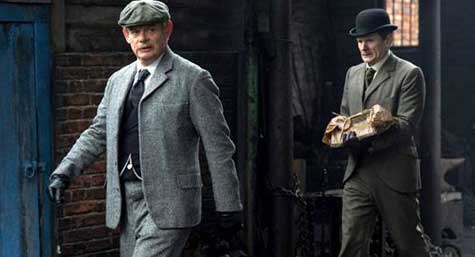
When we last saw our hero Arthur Conan Doyle (Martin Clunes), he and his faithful friend Alfred “Woodie” Wood (Charles Edwards) were chasing a hooded figure through the trees near the Edalji home. The mysterious individual eluded capture, but led them to a shrine-like arrangement of candles surrounding a doll that had been stolen from Maud Edalji’s room years before. It’s all very woo-woo in keeping with the gaslit, mud-caked, mist-shrouded sensibility of Arthur & George.
Moments later, who should show up but George Edalji (Arsher Ali), wearing mud-spattered boots and trousers? Surely this isn’t a coincidence. As a policeman explains, George is “in common parlance, not a ‘right sort’.” He’s a grown man who shares a bedroom with his father, habitually takes long walks at night to unspecified destinations, and isn’t permitted to have a razor of his own. Not to mention he’s already been tried and convicted, and served prison time, for a string of animal mutilations and murders in his hometown. There’s plenty of reason to consider him questionable.
Yet Arthur believes George is innocent of the crime for which he was convicted. Now he’s determined to exonerate him. “I can still tell a good story from a bad and a fact from a fiction,” Arthur insists, noting that his proof of George’s innocence hangs on “his poor eyesight, his limping gait, and his honest face.”
Meanwhile, tangible evidence against George continues to arise. For instance, we now know he was out alone on the night a number of horses were killed and the police found his damp, bloodstained coat at his home the next morning. The facts might not implicate him directly in the Great Wyrley Outrage of 1903 (the real crime at the heart of Julian Barnes’s novel Arthur & George), but they bear out the policeman’s assessment of George’s peculiarities. It’s a small step from peculiar to suspicious, and another small step from suspicious to guilty when a crime’s been committed in a small community. Or is that merely “what passes for logic in an unenlightened village,” as Arthur would have us believe?
A old school friend of George’s vouches for his character. On the other hand, there’s the problematic fact that George is a known associate of one Hayden Price—the criminal mastermind who inspired Doyle’s own creation Professor Moriarty.
Although Arthur Conan Doyle has thrown himself heart and soul into his crusade to clear George Edalji’s name, we still wonder whether his faith has been misplaced. It doesn’t help that, when confronted with one particular piece of potentially damning evidence, Arthur chooses to destroy it rather than show it to the police. That was hardly the gentlemanly thing to do. Faithful Woodie is aghast, and rightly so.
Arthur’s very patient lady-friend Jean Leckie (Hattie Morahan) is very patiently waiting for him to finish with this Edalji business and move on with his life. Jean believes that he’s latched on to George Edalji as a means of clearing his conscience of the guilt he feels over keeping company with her while his wife was dying. “That’s a rather tortured connection,” Arthur tells her. And it is, but it’s the one we’re left with because we haven’t heard a better explanation for Doyle’s fascination with Edalji.
Right now, as much as we want to believe that Arthur is the hero of his own story, there’s plenty to persuade us that he’s a well-intentioned dreamer on a misguided mission of mercy. If this were fiction, Arthur tells Woodie, he’d have changed the beginning or the end or done something different in the middle. But it’s not fiction; it’s real life. You can’t predict how it’s going to turn out. All you can do is wait to see what happens next.
Leslie Gilbert Elmanis the author of Weird But True: 200 Astounding, Outrageous, and Totally Off the Wall Facts. Follow her on Twitter @leslieelman.
Read all of Leslie Gilbert Elman’s posts for Criminal Element.
